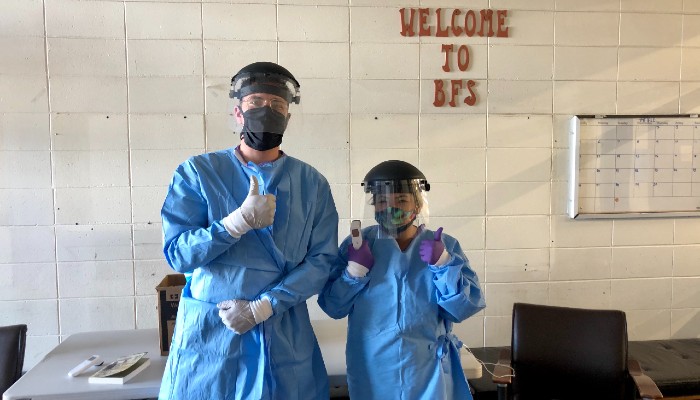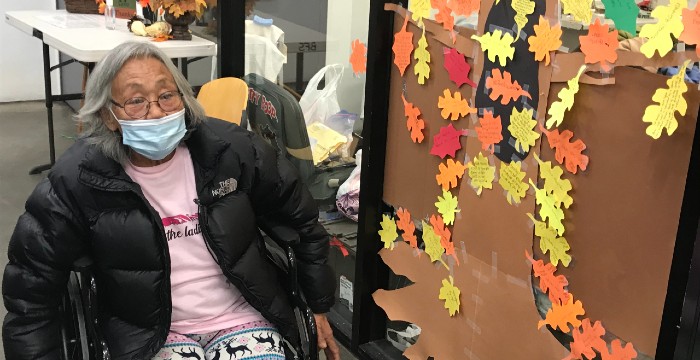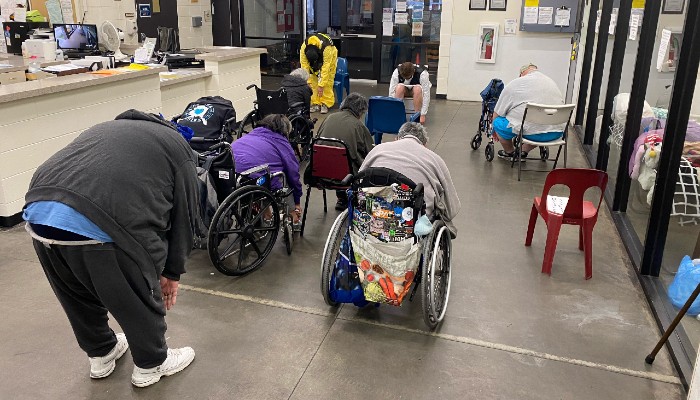
Catholic Social Services and Brother Francis Shelter worked through a range of strategic updates to ensure that those who needed it would have access to a safe and warm place to stay throughout the COVID-19 pandemic.
A Mass-Shelter for Anchorage
When cities across the US began detecting the first cases of COVID-19, Catholic Social Services started conversations with local government officials and partner agencies. We knew we had to reduce our capacity to keep people safe, so we asked the city what it would do to help. The shelter system in Anchorage was already heavily burdened, and shelters around the city, including Brother Francis Shelter, were at capacity.
Leaders at CSS and other homeless services around the city proposed a mass-shelter so that other shelters in the city could practice safe social distancing. The municipality listened and contracted to open the first socially distanced mass-shelter in Anchorage.
With the mass-shelter covering the overflow, Brother Francis Shelter (BFS) went from 240 guests to 114 and now to 60 guests. We knew that, due to the mass-shelter’s staircases, it would not be able to serve people with mobility problems, especially the elderly and medically fragile. Brother Francis Shelter’s accessible layout, embedded health clinic, and long partnerships with local hospitals made it the ideal place to care for those that the mass-shelter could not.
COVID-19 Safety Measures at Brother Francis Shelter
Staff at Catholic Social Services began to put dozens of safety measures into place to manage COVID-19 at a high-risk shelter:
- COVID-19 screening for guests, staff, and visitors
- Full PPE for staff and masks for guests
- COVID-19 testing
- Sleeping areas spaced at least 6 feet apart and available 24 hours per day
- More frequent cleaning and sanitation measures
- Changed from congregate dining to individual dining
- Added hand wash stations
Capacity Limited to High-Risk Guests
The maximum number of guests at BFS has been further reduced for guest and staff safety. Currently, Brother Francis Shelter provides shelter to approximately 60 guests each night. All guests are high-risk, meaning they are older than 60, have a medical condition that makes them more susceptible to the virus, or are unable to navigate stairs. These guests are encouraged to hunker down at the shelter during the day and night.
What to Expect as a Guest During COVID-19
While staying at the Brother Francis Shelter, a guest can expect to be treated with dignity and respect and to have access to a warm and safe place to stay.

Currently BFS has a reduced number of beds to accommodate social distancing safety protocols. BFS is also primarily serving individuals who experience accessibility challenges due to mobility. BFS is single-level, with no stairs. If you are able to climb and descend stairs safely, we will refer you to a different shelter, as our beds are extremely limited.
Guests of BFS are provided with a bunk that is available 24 hours per day. Our guests enjoy three meals per day and access to storage for belongings, a medical clinic, medical transportation, clothing resources, showers and laundry facilities, activities such as stretching, bingo, movie night, arts & crafts, monthly speakers, case management, and more.
If you need shelter and cannot climb or descend stairs safely due to physical ability, please call 907-277-1731. BFS staff will make sure we have a bed available or add you to our waitlist. We look forward to serving you.
The Silver Lining in Trying Times
Despite these difficulties, there is hope. Because Brother Francis Shelter was decongested, the shelter and neighborhood are less crowded and more peaceful. With fewer guests, staff have more bandwidth to provide more individualized care and services. Guests report much better sleep and there have been fewer behavioral incidents, which in turn has led to a sharp drop in emergency calls.

Additional Programming for Guests
Staff at BFS are also providing more programming and activities for guests. This includes:
- First Fridays, where medical professionals and others speak about relevant issues like women’s health, emergency preparedness, fall prevention, tobacco cessation, and more
- Wellness Wednesdays, where staff lead exercise classes, share lunch, and lead uplifting discussions with guests
- The decompressed environment made way for new projects like the Medical Respite Garden
- Plus, we’ve hosted activities like bingo, movie nights, stretching, arts and crafts, a talent show, Gratitude Tree and Gratitude Journals, many of which were suggested by the guests themselves.
These activities and programs provide guests with creative outlets, healthy lifestyle guidance, and the foundation for a strong and positive future.
Most people experiencing homelessness have experienced trauma—homelessness itself is traumatic. Because of this many may suffer from substance misuse and challenges with physical and mental health. These small initiatives and programs are often what they need to move forward, to help restore their sense of safety, self-worth, belonging, which greatly helps their healing by helping them build a strong foundation so that they can successfully maintain permanent and stable housing.
Support Brother Francis Shelter
Our generous donors continue to be another silver lining in these trying times. It’s thanks to you that we’re able to keep our guests safe, warm, and cared for at Brother Francis Shelter.